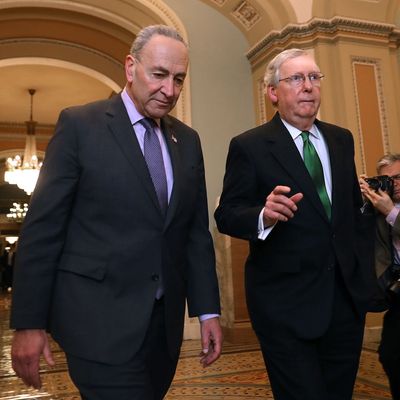
Nearly a month after Democrats gained control of the U.S. Senate by winning two runoffs in Georgia, they will be given committee chairmanship gavels and other privileges of the majority after Chuck
Schumer and Mitch McConnell announced a “power-sharing agreement” had been reached. Since the Senate is divided 50-50 by the two major-party conferences, the deal was necessary to provide for committee memberships and chairmanships and to keep Vice-President Kamala Harris from the chore of constantly going to the floor to break ties even on routine matters.
As Fox News reported, the deal was based on a similar arrangement made in 2001, the last time the Senate was divided evenly. If so, that means equal committee membership between Democrats and Republicans and the ability to take up legislation on the floor on a tie vote in those committees. But at last, Democrats will get their committee chairmanships and begin to set their own priorities:
Schumer already announced the new Democratic committee chairs, including Sen. Bernie Sanders, I-Vt., as chair of the Budget Committee; Sen. Joe Manchin, D-W.Va., as Chair of the Energy and Natural Resources Committee; Sen. Gary Peters, D-Mich., as leader of the Homeland Security and Governmental Affairs Committee, and Sen. Dick Durbin, D-Ill, as the head of the Judiciary Committee …
“I’ve already instructed the incoming Democratic chairs of all relevant committees to begin holding hearings on the climate crisis in preparation for enacting President Biden’s ‘Build Back Better’ agenda,” Schumer said of Biden’s green jobs plan.
The deal will also end the awkward practices of Biden Cabinet confirmation hearings being chaired by lame-duck Republicans.
For some time, the power-sharing arrangement was held up by McConnell’s demands that Democrats formally eschew any intention of abolishing the filibuster in the text of the organizing resolution for the 116th Congress, which determines Senate procedures. The filibuster, of course, is the major source of Republican power in the upper chamber right now. And absent an agreement, Republicans were in a position to filibuster the organizing resolution itself. McConnell relented last week but got more or less what he wanted, as Vox’s Li Zhu explained:
[W]hile he didn’t get the changes to the organizing resolution he wanted, McConnell’s approach still worked, in a way: Amid the impasse over the agreement, two Senate Democrats — Joe Manchin (D-WV) and Kyrsten Sinema (D-AZ) — publicly restated that they would not vote to eliminate the filibuster. Without their backing, Democrats simply won’t have the numbers to do a rules change: All 50 members of the caucus would need to get behind a change to the filibuster for it to happen. (This position is consistent with stances both lawmakers have vocalized before.)
It’s possible, of course, that Democrats could convince Manchin and Sinema to support some sort of filibuster reforms short of outright abolition, which would not have been possible if categorical filibuster protections had been placed in the organizing resolution. So both sides can claim a tactical win in the power-sharing arrangement.






























